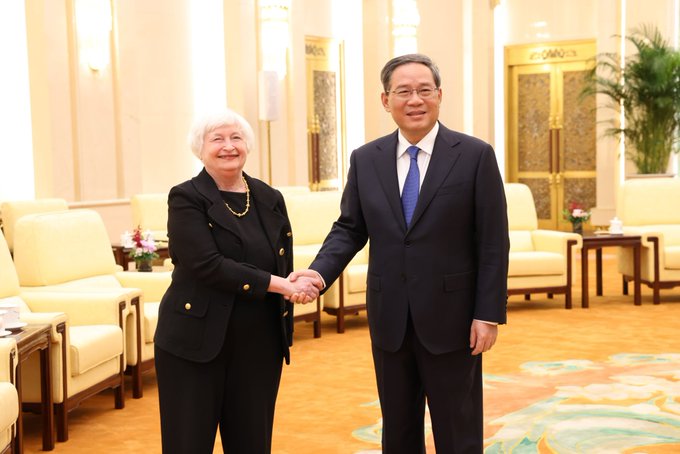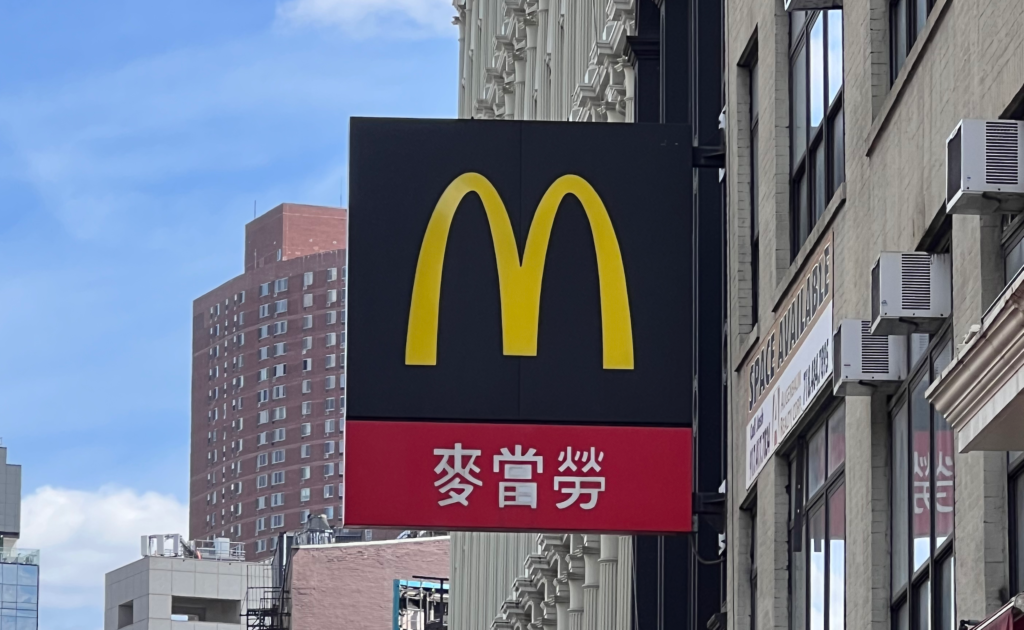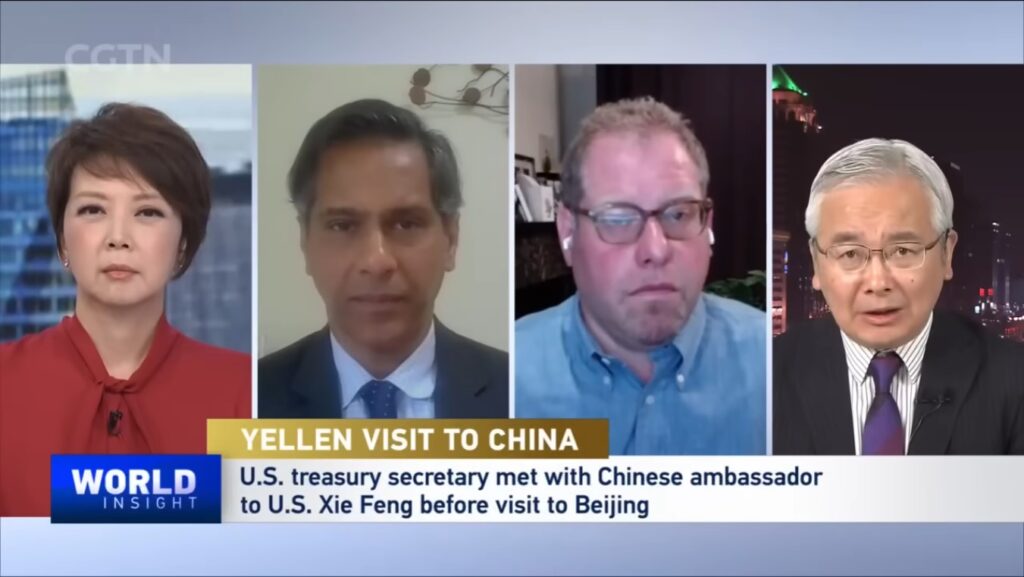
ICAS Bulletin (online ISSN 2836-3418, print ISSN 2836-340X) is published every other week throughout the year at 1919 M St NW, Suite 310, Washington, DC 20036.
The online version of ICAS Bulletin can be found at chinaus-icas.org/bulletins/.

– U.S. Secretary of the Treasury Janet Yellen successfully completed her multiple-day trip to Beijing on July 9, 2023. Secretary Yellen praised the progress of stabilizing bilateral ties between the U.S. and China. Secretary Yellen also stated that the U.S. would be clear about future restrictions moving forward, which will not have a “fundamental impact” on China.
– Additionally, during her visit to Beijing Secretary Yellen urged China to become more involved in supporting international climate institutions, stressing the importance of increasing green finance and climate initiatives.
– Later in an interview with Bloomberg, Secretary Yellen said that, while “slow growth in China can have some negative spillovers” in the U.S., she does not expect a recession.
– Despite Secretary Yellen’s visit being hailed as successful by analysts, Chinese netizens labeled economics Yellen met with as being “radical feminists” and traitors.
– Secretary Yellen reaffirmed that the U.S. would “firmly” oppose export controls enacted by China on gallium and germanium, both of which are used to produce electronics and semiconductors.
Associated News References:
“Yellen Says US Investment Curbs Won’t ‘Fundamentally’ Hurt China,” Bloomberg, July 17 [Paywall]
“Yellen Says China Slowdown Risks Spillovers But No US Recession,” Bloomberg, July 17 [Paywall]
“Recent US diplomacy push aimed at China meant to soften blow of coming hi-tech export limits: analysts,” South China Morning Post, July 13 [Paywall]
“Janet Yellen Hails Progress in Stabilizing Rocky U.S.-China Ties,” The Washington Post, July 9 [Paywall]
“Chinese women economists called ‘traitors’ online for meeting with Yellen,” Reuters, July 10
“Janet Yellen urges China to boost funding to tackle climate crisis,” The Guardian, July 8

– The U.S. House Select Committee on the Chinese Communist Party sent a letter to the University of California, Berkeley requesting information about the Tsinghua-Berkeley Shenzhen Institute; a collaborative research institute set up in 2014.
– The Chinese Foreign Ministry office in Hong Kong has denounced the Biden administration’s extension of the ‘national emergency’ in Hong Kong, which revokes some special privileges and prevents sensitive technologies from being exported to the city.
– A U.S. Navy patrol plane flew through the Taiwan Strait and was monitored by Chinese PLA fighter jets during the third day of Chinese military exercises south of Taiwan.
– China has made accusations that the U.S. was “ganging up” with allies and making China accept a 2016 ruling over claims in the South China Sea; the ruling from the Permanent Court of Arbitration in The Hague stating that nearly all of the Chinese claims to the area lack validity.
– According to Microsoft, Chinese hackers were able to breach and gain access to government email accounts, reportedly targeting certain governmental organizations and employees.
– The Chinese government has issued a warning to citizens traveling to the U.S. to beware of “entrapment” by American law enforcement agencies, stating that citizens should be more “vigilant and beware of falling into U.S. snares and arrest entrapment.”
Associated News References:
“House Committee Targets U.C. Berkeley Program for China Ties,” The New York Times, July 17 [Paywall]
“US Navy plane flies through Taiwan Strait, China carries out more drills,” Reuters, July 13
“Chinese foreign ministry’s arm in Hong Kong slams United States for renewing city’s ‘emergency status’,” South China Morning Post, July 12 [Paywall]
“China blasts US for forcing it to accept South China Sea ruling,” Reuters, July 12
“Chinese Hackers Breached Government Email Accounts, Microsoft Says,” The New York Times, July 11 [Paywall]
“China Warns Its Citizens on ‘Entrapment’ by US Law Enforcement,” Bloomberg, July 10 [Paywall]

– The Carlyle Group and Trustar Capital are looking to incur US$4 billion in funding to buy back their stakes in McDonald’s Corp operations within Hong Kong and Mainland China, the exit from the firms would end their six year long ownership of the Chinese operations.
– Tesla has begun to lay off employees at their Chinese battery plant in Shanghai, after the current volatile price war for electric cars in China has begun to show signs of cooling.
– The U.S. Public Company Accounting Oversight Board (PCAOB) has begun to lead investigations of routine checks of Wall Street-listed Chinese companies and their audits in Hong Kong.
– Meta CEO Mark Zuckerburg has come under fire in China after his company announced plans to partner with Tencent to market new Quest VR devices, with the controversy stemming from his previous failures to enter the Chinese market and accusing Chinese rival companies of intellectual property theft.
– Tesla has begun to increase deliveries within China, as concerns over consumer demand and supply chain worries begin to cool and as interest increases in the largest electric vehicle market.
– U.S.-based Moderna Inc. has plans to announce their first investments in China, despite increased bilateral tensions and restrictions on U.S. firms. The investments may include multiple projects with a total investment amount of US$1 billion.
Associated News References:
“McDonald’s China owners Carlyle, Trustar plan $4 billion exit, Bloomberg reports,” Reuters, July 13
“Tesla Starts to Lay Off Some Battery Workers at China Plant,” Bloomberg, July 7 [Paywall]
“US starts new round of audit inspections on China firms – source,” Reuters, July 7
“Zuckerberg Under Fire in China After Report of Quest Sale Talks,” Bloomberg, July 5 [Paywall]
“Tesla Regains China Momentum as Clouds Over EV Sector Disperse,” Bloomberg, July 5 [Paywall]
“Moderna Set to Invest $1 Billion in China, Yicai Reports,” Bloomberg, July 4 [Paywall]

– U.S. Presidential Envoy for Climate John Kerry, conducted the first major climate talk with Chinese counterparts in over a year. Kerry stated that the U.S. would take “big steps that will send a signal to the world” noting that “it is vital that we come together to take action.”
– U.S. Secretary of State Antony Blinken finished “candid and constructive” discussions with Chinese diplomat Wang Yi, the meeting discussed a variety of topics including managing competition and maintaining peace and stability across the Taiwan Strait. The meeting came despite new allegations that Chinese hackers infiltrated senior US officials’ email accounts.
– The Chinese government has encouraged the U.S. to lift “unilateral” sanctions on Chinese enterprises, and has encouraged the possible visit from U.S. Secretary of Commerce Gina Raimondo.
Associated News References:
“US-China Climate Talks Reopen With Vow to Take ‘Big Steps’,” Bloomberg, July 17 [Paywall]
“Kerry Says U.S. and China Must Set Aside Politics to Tackle Climate Change,” The New York Times, July 17 [Paywall]
“Blinken, Wang meet again for talks aimed at managing U.S.-China competition,” Reuters, July 14
“Looming U.S. Investment Restrictions on China Threaten Diplomatic Outreach,” The New York Times, July 13 [Paywall]
“Blinken Meets China’s Top Diplomat as Email Hack Roils Ties Anew,” Bloomberg, July 13 [Paywall]
“China renews call for US to lift sanctions; ‘open’ to Raimondo visit,” Reuters, July 13
“John Kerry to Visit China to Restart Climate Negotiations,” The New York Times, July 6 [Paywall]

– On July 16, U.S. Senate Majority Leader Chuck Schumer announced that he will be supporting a bipartisan amendment this week to sanction China over its alleged role in producing fentanyl, a synthetic opioid.
– Members of congress are debating whether to add changes to a current bill which would clarify the impact of authorizing the Biden administration to ban Chinese-owned TikTok, according to the members of the Senate Intelligence Committee.
– U.S. critics have been protesting the increasing involvement from U.S. technology giants within the Indo-Pacific Trade Talks, as critics say the tech firms are using the agreement to mitigate domestic regulation and antitrust laws.
– The Biden administration has made statements opposing China’s new restrictions on the export of germanium and gallium, with the U.S. Commerce Department said that “these actions underscore the need to diversify supply chains.”
– Former Chinese Vice Commerce Minister Wei Jianguo told China Daily that if countries continue to add pressure to China’s technology industry, they should expect countermeasures to escalate. His statements came just as China enacted new controls on gallium and germanium before Secretary Yellen’s visit. Analysts have also predicted that Secretary Yellen’s visit, as well as other visits to Beijing by top U.S. diplomats, were aimed to soften the blow of the incoming export limits from China.
– The Biden administration has announced plans to place restrictions on Chinese organizations’ access to U.S. cloud-computing services.
Associated News References:
“US Senate leader Schumer wants to sanction China over fentanyl,” Reuters, July 16
“TikTok crackdown bill may need changes, US senator says,” Reuters, July 11
“Tech Giants Play Too Big a Role in US Indo-Pacific Trade Talks, Critics Say,” Bloomberg, July 10 [Paywall]
“US exporters snub de-risking to give China another shot – but they’re finding a new obstacle,” South China Morning Post, July 8 [Paywall]
“Tech war: US opposes China’s metal export controls, saying they justify supply chain moves,” South China Morning Post, July 7 [Paywall]
“US says it opposes export controls by China on metals, will consult allies,” Reuters, July 6
“China’s chipmaking export curbs ‘just a start’, Beijing adviser warns before Yellen visit,” Reuters, July 6
“U.S. Looks to Restrict China’s Access to Cloud Computing to Protect Advanced Technology,” The Wall Street Journal, July 4 [Paywall]

“Taiwan election candidate risks China’s anger with planned US trip,” Financial Times, July 17 [Paywall]
“Biden administration warns Beijing against ‘brazen coercion’ in response to Taiwan VP visit,” Politico, July 17
“Xi Jinping’s foreign minister has vanished from public view. His prolonged absence is driving intense speculation,” CNN, July 17
“US expected to get around China’s export controls on gallium, an essential component for American military radar tech,” South China Morning Post, July 17 [Paywall]
“Smithsonian abruptly cancels Asian American literary festival,” The Washington Post, July 14 [Paywall]
“Biden’s Energy Funds Fall Behind Schedule Over China Scrutiny,” Bloomberg, July 14 [Paywall]
“Elon Musk says China is ‘on team humanity’, willing to work with US on existential AI threats,” South China Morning Post, July 13 [Paywall]
“NATO removes Tokyo office mention from joint communique,” Nikkei Asia, July 11 [Paywall]
“Foreign ministers from Asean, key partners to meet in Jakarta this week,” The Strait Times, July 10 [Paywall]
“European firms look for footing in China-U.S. spat, French execs say,” Reuters, July 10
“NATO’s New Focus on China Creates Internal Tension About Mission Creep,” The Wall Street Journal, July 8 [Paywall]
July 14 hosted by Foreign Policy
July 13 hosted by House Select Committee on the Strategic Competition Between the United States and the Chinese Communist Party
July 13 hosted by Wilson Center
July 12 hosted by The US-China Business Council
July 12 hosted by International Institute for Strategic Studies
July 11 hosted by The China Project
July 10 hosted by The US-China Business Council
July 7 hosted by Foreign Policy
July 20 hosted by Foreign Policy
July 20 hosted by Hudson Institute
July 25 hosted by Wilson Center
July 26 hosted by Brookings
July 31 hosted by Hoover Institution
Released the first week of every new quarter, the BCCC Quarterly is a magazine-style newsletter that records the most important trends and developments regarding blue carbon and climate change policies and regulations in China, the U.S., and other regions, as well as international regimes such as the United Nations. It also includes two special sections — the ‘Theme of the Quarter’ and the ‘Blue Carbon Country Profile’ — that aim to bring a fresh element to each issue.
The Theme of the Quarter was written by ICAS Research Assistant Intern Skyler Standridge and was written on Electric Vehicle Popularization.
The Blue Carbon Country Profile of Quarter 2, 2023, on Indonesia, was written by ICAS BCCC Research Assistant Zhangchen Wang.
July 12, 2023
By Yilun Zhang and Amanda Jin
When the 118th Congress convened on January 3, 2023, there was solid bipartisan consensus in Congress and in Washington to primarily view the U.S.-China relationship through the lens of strategic competition. Despite the fact that the Biden administration’s approach on China has been through multiple phases of development, the eventual framework of “invest, align, and compete” defined the general trajectory of the U.S.-China relationship. The 118th Congress has inherited where the 117th Congress ended on China—with the then-Speaker of the House Nancy Pelosi visiting Taiwan and stirring up an intensive bilateral diplomatic and security showdown as well as the passage of the “China competition bill,” formally referred to as the Strategic Competition Act of 2021. Therefore, the 118th Congress wasted no time beginning their search to develop America’s new approach to outcompete China.
Within this consensus to outcompete China, congressional leadership encouraged many lawmakers to not only make China a legislative priority, but also to look beyond the traditional areas and typical means to enhance American leadership. Soon after the midterm election, held in November 2022, then-Minority Leader, now-Speaker of the House Kevin McCarthy announced plans to establish a special committee on China, calling for and successfully receiving bipartisan support to prioritize China as a long-term challenge of American leadership and interests. In the Senate, key lawmakers in both parties similarly highlighted the U.S.-China strategic competition and named China as a legislative priority. Notably, the strategic competition with China has become a rare case of bipartisan and bicameral unison at a time when lawmakers regularly clash over other issues such as debts and budgets.
This rise in attention is evident from a numerical standpoint alone. From January to April 2023, the 118th Congress introduced more than 250 bills related to China; a clear increase compared to the 130 introduced over the first four months of the 117th Congress. With a shared understanding of China’s importance and Congress’ strategic objective on China, lawmakers have been more active than ever on issues ranging from trade, national security and sanctions to human rights, democratic values, Taiwan, and China’s global influence.
June 15, 2023
On June 15, 2023 [JST], ICAS Executive Director & Senior Fellow Dr. Nong Hong participated as a panelist in the 2023 DILA-KOREA and ICIS Roundtable, which focused this year on ‘East Asian States’ Potential Leadership’. Dr. Hong spoke virtually in Session 1: East Asia and Geopolitical Competition in the Indo-Pacific Region.
By Sourabh Gupta
July 27, 2023
In June 2023, four months after a wayward surveillance balloon blew his impending visit off course, US Secretary of State Antony Blinken visited Beijing to set about erecting the ‘guardrails’ US President Joe Biden and Chinese President Xi Jinping envisaged in Bali in November 2022. He was followed in early July by Treasury Secretary Janet Yellen. The United States and China may be close to stabilising their rocky relationship — an opportunity they must not pass up.
The Biden administration’s strategy on China has been to invest in domestic competitiveness, align efforts with a network of allies and partners and, harnessing these assets, compete with China. The administration has also sought to isolate China via the Summit for Democracy, Quad and Indo-Pacific Economic Framework, and through bodies such as the G7. Having incentivised or leaned on allies to chip away at their relationships with China, Washington now seeks to establish a ‘floor’ under its own working relations with Beijing…
On Friday, July 7, 2023, Senior Fellow Sourabh Gupta discussed Treasury Secretary Yellen’s visit to Beijing on CGTN’s World Insight.
On Thursday, July 6, 2023, Senior Fellow Sourabh Gupta was quoted in the Associated Press on Treasury Secretary Yellen’s impending visit to Beijing
On Wednesday, July 5, 2023, Research Associate Jessica Martin was quoted in International Business Times on U.S. participation in the World Artificial Intelligence Conference.
On Wednesday, July 5, 2023, Senior Fellow Sourabh Gupta was quoted in the South China Morning Post on Xi Jinping’s Global Civilization Initiative and soft power.


The Institute for China-America Studies is an independent nonprofit, nonpartisan research organization dedicated to strengthening the understanding of U.S.-China relations through expert analysis and practical policy solutions.
1919 M St. NW Suite 310,
Washington, DC 20036
icas@chinaus-icas.org
(202) 968-0595
© 2025 INSTITUTE FOR CHINA-AMERICA STUDIES. ALL RIGHTS RESERVED.